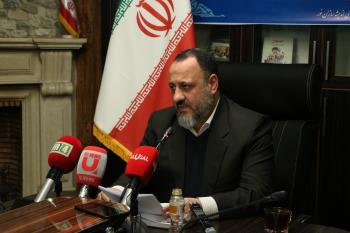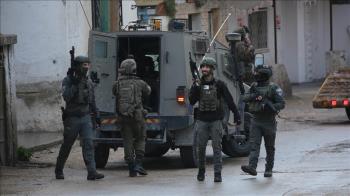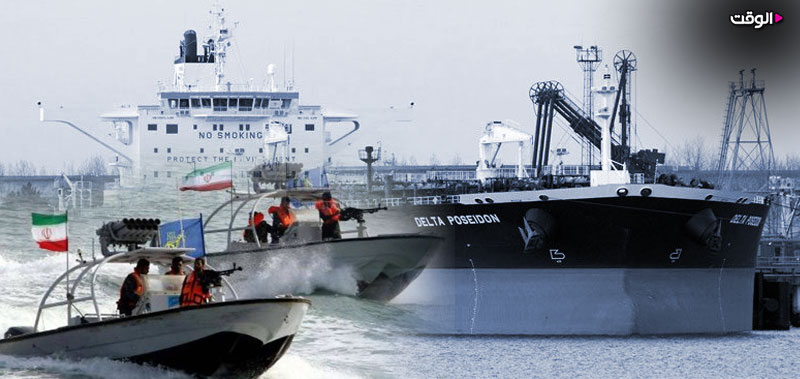Alwaght- Iran’s Islamic Revolution Guards Corps (IRGC)announced in a statement on Friday that it seized two Greek tankers, Delta Poseidon and Prudent Warrior, off Asaluyeh and Bandar Lengeh coasts.
The Revolutionary Guards have warned Greece that 17 more Greek ships could be seized in the area if the Lana tanker, which Athens seized carrying Iranian oil April, is not released. Both seized ships are said to have a total capacity of about 300,000 tons, equivalent to 1.8 million barrels of oil or other petroleum products, which is now in the possession of Iran.
The Greek government protested the move, issuing statements accusing Iran of "piracy." The Greek foreign ministry called for the immediate release of the ships and their crews, saying such actions would have negative consequences for bilateral and Iran-EU relations.
Greece accuses Iran of piracy while on April 19 it seized the Russian tanker Lana, which was carrying 115,000 tons of crude oil, off the Ovia island, and forty days later claimed it delivered its load to the US. Athens said that this decision was made at the US request and in order to implement sanctions against Iran and Russia. The seized tanker is owned by Russia but its oil shipment belonged to Iran, and Iranian officials repeatedly asked the Greek government to return the tanker, but the Greeks eventually yielded to Washington. The Americans claim that they are ready to reach an agreement with Iran on its nuclear program, but on the other hand, they are taking steps that make the agreement far beyond reach. The actions by the Islamic Revolutionary Guards Corps (IRGC) showed that Iran still keeps active the tit-for-tat principle, and that if the West wants to plunder Iran's property, Iran can impose double costs on them.
Not learning from Britain experience
Greece seems to have forgotten the British experience which bore consequences for London. In early July 2019, when Britain seized the Iranian oil tanker in Gibraltar, Iranian authorities called on the British government to release its Grace 1 oil tanker. But London rejected, giving Iran a reason to resort to punitive measures. On July 14, Iran seized British Stena Impero tanker while passing the Strait of Hormuz for "violation of the international navigation rules." At the time, an IRGC statement said that the vessel moved in wrong navigation line, turned off its tracking signals, and ignored warnings by the Iranian coast guard that ordered it to stop to avoid a possible incident.
Britain, which is itself the king of piracy, accused Iran of piracy and initially had no intention of delivering the Iranian tanker and resisted the Iranians' request but eventually surrendered after Iranian reciprocal seizure. Greece, too, has followed in the footsteps of the Britain this time and is now at a crossroads as to yield to the American request or for saving its own ships yield to Iran. Iran has already proven that it would not pay ransom and so Athens would surrender to Tehran at the end of the road. Greece knows that in addition to these oil shipments, its other shipments would face the same fate and so it would face challenges meeting its energy challenges.
Iran would not pay ransom
Iran has always shown that it respects the rights of all countries for free international navigation and shipping, but will also take retaliatory and punitive measures when its interests are jeopardized by other actors.
The actions of the US and its allies to seize Iranian oil tankers under the pretext of sanctions are examples of piracy that will not go unpunished, and they should know that such actions cannot prevent the IRGC from confronting their maritime violations. Although these countries are obedient to US demands and have no free will, they should know that in case of tensions with Iran, Washington will not defend their interests and so they should consider all aspects in their decisions. Iran has repeatedly warned that if the West continues its escalating measures, it could disrupt oil shipments from the Persian Gulf by closing the Strait of Hormuz.
The seizure of British and Greek tankers by the Iranian coast guard sends a message to the West: Iran will not appease them when it comes to defense of its national interests and will not give up on its interests and respond decisively to hostile actions. If the West wants to hijack Iranian tankers whenever they want under the pretext of sanctions, they must also take into account that the hit and run era is over, and if they miscalculate, Iran has the potentials and tools for punishment.
Iran's legal right for self-defense
The West always exaggerates about the Iranian measures in the region to garner international support for anti-Iranian pressures, but such propaganda campaigns go nowhere. After all, it was Greece that began the tanker seizure game and so Iran's response falls within the international laws and is not piracy. Under two 1958 Geneva and 1982 Jamaica conventions, which set a legal system of international waterways and the right of passage of ships, Iran has the right to take similar actions if its national interests are at stake. Therefore, Iran's action has been to retaliate and defend its own interests and its inalienable right. Given that Washington and its allies have spared no hostile action against Iran over the past four decades and repeatedly pursued these wrong policies in the past, their provocative actions are not to be limited to the present time and will continue in the future. Iran, on the opposite side, is determined to take measures in protection of its interests.
From another dimension, the Americans claim they seek ways to replace the Russian oil to contain the global oil price crisis, but in practice they move the wrong way. Seizing the Iranian oil tanker not only does not help calm the global energy markets but also it escalates the tensions that result in new challenges to energy markets and further price hikes as preliminary consequences.
Washington's hostile policy against Iran comes amid claims of seriousness about reviving the nuclear deal, officially called Joint Comprehensive Plan of Action (JCPOA). Iran demands show of good will measures like lifting part of the sanctions, including on its oil exports, for the US to show its serious intention for restoration of the 2015 deal. But the Americans keep making their past mistakes and show no determination for an agreement with Tehran.



























